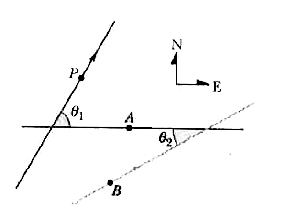A motorboat starting from rest on a lake acceleration line at a constant rate of 3.0m/s2 for 8.0s. How far does the boat travel during this time ?
To solve the problem of how far the motorboat travels while accelerating, we can use the second equation of motion. Here’s a step-by-step breakdown of the solution:
Step 1: Identify the given values
- Initial velocity (u) = 0 m/s (the boat starts from rest)
- Acceleration (a) = 3.0 m/s²
- Time (t) = 8.0 s
Step 2: Write down the second equation of motion
The second equation of motion is given by:
s=ut+12at2
where:
- s is the displacement,
- u is the initial velocity,
- a is the acceleration,
- t is the time.
Step 3: Substitute the known values into the equation
Since the initial velocity u is 0, the equation simplifies to:
s=0⋅t+12at2
s=12⋅3.0⋅(8.0)2
Step 4: Calculate t2
Calculate (8.0)2:
(8.0)2=64.0
Step 5: Substitute t2 back into the equation
Now substitute t2 back into the equation:
s=12⋅3.0⋅64.0
Step 6: Calculate the displacement
Now calculate the displacement:
s=12⋅3.0⋅64.0=1.5⋅64.0=96.0m
Final Answer
The boat travels a distance of 96 meters during this time.
---
- Initial velocity (u) = 0 m/s (the boat starts from rest)
- Acceleration (a) = 3.0 m/s²
- Time (t) = 8.0 s
The second equation of motion is given by:
s=ut+12at2
where:
- s is the displacement,
- u is the initial velocity,
- a is the acceleration,
- t is the time.
Since the initial velocity u is 0, the equation simplifies to:
s=0⋅t+12at2
s=12⋅3.0⋅(8.0)2
Calculate (8.0)2:
(8.0)2=64.0
Now substitute t2 back into the equation:
s=12⋅3.0⋅64.0
Now calculate the displacement:
s=12⋅3.0⋅64.0=1.5⋅64.0=96.0m
The boat travels a distance of 96 meters during this time.
Topper's Solved these Questions
- MOTIONBOOK - PRADEEPCHAPTER - MOTIONEXERCISE - NCERT short answer question
7 Videos
- MOTIONBOOK - PRADEEPCHAPTER - MOTIONEXERCISE - Long answer question
12 Videos
- MOTIONBOOK - PRADEEPCHAPTER - MOTIONEXERCISE - NCERT queations
20 Videos
- GRAVITATIONBOOK - PRADEEPCHAPTER - GRAVITATIONEXERCISE - Model Test paper (1)
36 Videos
- SOUNDBOOK - PRADEEPCHAPTER - SOUNDEXERCISE - Model Test (sec - B)
12 Videos
Similar Questions
Knowledge Check
A particle starts moving from rest at t=0 with a tangential acceleration of constant magnitude of πm/s2 along a circle of radius 6 m. The value of average acceleration, average velocity and average speed during the first 2√3 s of motion, are respectively :
A3√2m/s2,πm/s,π√3m/sBπm/s2,2√3m/s,π√3m/sCπ√3m/s2,2√3m/s,πm/sDNone of the aboveAt t=0 and x=0 , an initially stationary blue car begins to accelerate at a constant rate of 2.0m/s2 in the positive direction of the x -axis At =t = 2s a red car travelling in an adjecent lane and in the same direction passes x =0 with a speed of 8.0m/s and a constant accleration of 3.0m/s2 .the time when red car passes the blue car is :
A4.2 sB3.6 sC2.9 sDNone of these
A body is accelerating at a constant rate of 10m/s2 . If the body starts from rest , how much distance will it cover in 2 seconds ?
View SolutionA car, starting from rest, moves in a straight line with constant acceleration . 4m/s2 After some time, it immediately starts retarding at constant rate 2m/s2 until it comes to rest. If the car moved for a total time 18 seconds, the total distance covered is
View SolutionA particle starting from rest moves with constant acceleration. If it takes 5.0 s to reash the speed 18.0 km/h find a. the average velocity during this period, and b. the distance travelled by the particle during this period.
View SolutionA train starting from rest moves with a uniform acceleration of 0.2m/s2 for 5 minutes . Calculate the speed acquired and the distance travelled in this time.
View SolutionAn object having a velocity 4.0 m/s is accelerated at the rate of 1.2ms2 for 5.0s. Find the distance travelled during the period of acceleration.
View SolutionIn the overhead view of Fig. 4-40, Jeeps P and B race along straight lines, across flat terrain, and past stationary border guard A. Relative to the guard, B travels at a constant speed of 25.0 m/s, at the angle θ2=30.0∘. Relative to the guard, P has accelerated from rest at a constant rate of 0.400m/s2 at the angle θ1=60.0∘. At a certain time during the acceleration, P has a speed of 40.0 m/s. At that time, what are the (a) magnitude and (b) direction of the velocity of P relative to B and the ( c) magnitude and (d) direction of the acceleration of P relative to B?

View Solution
